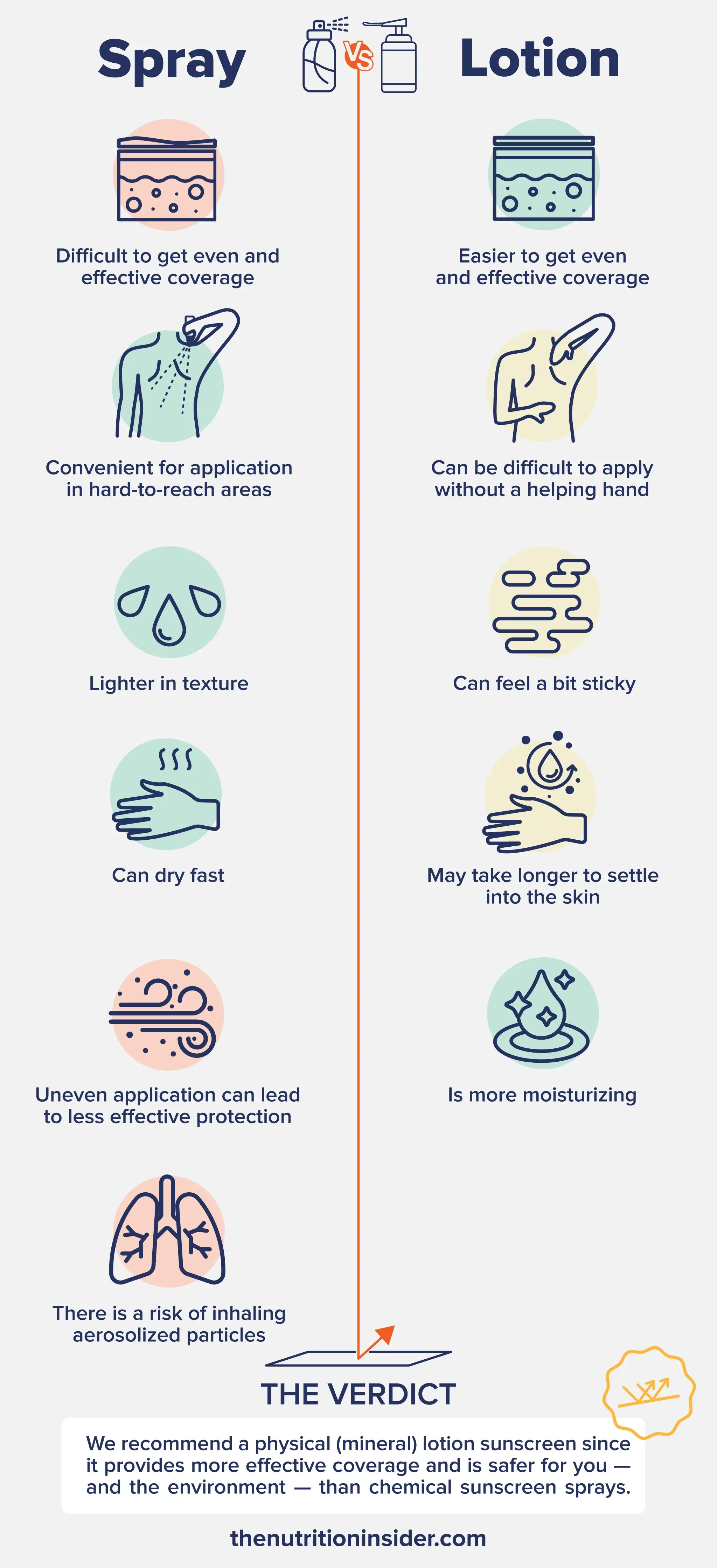This post contains links through which we may earn a small commission should you make a purchase from a brand. This in no way affects our ability to objectively critique the products and brands we review.
Is Spray or Lotion Sunscreen Better?
Evidence Based Research To fulfill our commitment to bringing our audience accurate and insightful content, our expert writers and medical reviewers rely on carefully curated research.
Read Our Editorial Policy
Consumers have almost too many choices for protecting themselves from harmful UV rays these days.
This can make it overwhelming to decide what SPF level to use, whether to use physical or chemical sunscreen, and whether to use separate sunscreen for your face and body.
(Luckily, we have a handy article about the differences between physical and chemical sunscreen here.)
Another question you might be asking yourself is whether you should buy a spray or lotion sunscreen.
While spray sunscreen is the better option if you’re flying solo and don’t have the flexibility to apply sunscreen in those hard-to-reach areas, sunscreen lotions can sometimes be more effective and safer.
The Key Differences Between Spray and Lotion Sunscreens
The differences between lotion and spray sunscreen are pretty straightforward, but let’s lay out the details.

Lotion Sunscreen
Sunscreen lotions typically come in a viscous liquid or cream form. They are applied directly to the skin and rubbed in to spread evenly. They can contain either physical (mineral) or chemical ingredients.
Lotion sunscreens can provide more thorough and even coverage, making it easier to see where you’ve applied the product. They can also be more moisturizing, benefiting people with dry skin.
The primary downside to lotion sunscreen is that it can be difficult to apply without a helping hand. Additionally, some lotions can feel a bit sticky, which could be uncomfortable for some people and may take longer to settle into the skin.
Spray-on Sunscreen
On the other hand, spray sunscreen products are aerosolized. This makes them convenient for quick and easy application, especially in hard-to-reach areas like the back.
Spray sunscreens are generally lighter in texture and can dry faster than lotions.
However, despite being easier to reach your back, ensuring even coverage can still be challenging.
Since sprays should be applied outdoors, they are also more likely to be dispersed by wind, which could result in uneven application and less effective protection from UV radiation.
With this in mind, you will likely still have to rub it in to ensure an even application.
The biggest downside to spray sunscreen, though, is the risk of inhaling aerosolized particles. This is obviously not ideal for anyone, but can be even worse for younger children or individuals with respiratory issues.
Inhaling physical sunscreen ingredients is actually one of the only risks it poses to consumers. This is despite the fact that the FDA and the Environmental Working Group (EWG) consider the main two ingredients, titanium dioxide and zinc oxide, safe.
This is the opposite of chemical sunscreen ingredients, whose safety has been called into question by several regulatory agencies, regardless of whether they are applied as a spray or lotion.
Key Takeaways
When deciding between spray and lotion sunscreen, there are several points to consider when making your purchase.
The most important factor (besides the Sun Protection Factor) is that your sunscreen is broad-spectrum, which blocks UVA and UVB rays and prevents sun exposure.
While both lotion and spray-on sunscreens can be broad-spectrum, the best sunscreen is the one you’ll actually apply.
For example, if you avoid putting on sunscreen because you hate the feeling of sticky sunscreen on your hands, you may be better off with spray sunscreen. However, even then, you may need to rub it in for the best protection.
With that in mind, you may as well use lotion sunscreens. (Just wash your hands afterward to avoid the sticky residue.)
They tend to provide more even and effective coverage because you can see and feel where you’ve applied it, avoiding the chance of missing spots. You also eliminate the possibility of inhaling the ingredients.
So, if you were dying to know our choice, we recommend a physical (mineral) lotion sunscreen since it provides more effective coverage and is safer for you—and the environment—than chemical sunscreen sprays.
FAQs
Is spray sunscreen as effective as lotion?
Spray sunscreen can be as effective as lotion if applied correctly. However, it is often harder to ensure even coverage with sprays, leading to missed spots and less effective protection. For best results, spray generously and rub it in to ensure even coverage.
Are you supposed to rub in spray sunscreen?
Yes, you should rub in spray sunscreen after application. Spraying alone can leave an uneven layer. Rubbing it in helps to ensure full and even coverage, providing better protection against UV rays.
Does spray sunscreen dry out your skin?
Spray sunscreens can sometimes be less moisturizing than lotion sunscreens, which might lead to dry skin, especially if you have a tendency toward dryness. However, they don’t actively dry out your skin. If you have dry skin, look for spray sunscreens with added moisturizing ingredients to help prevent it from drying out.








